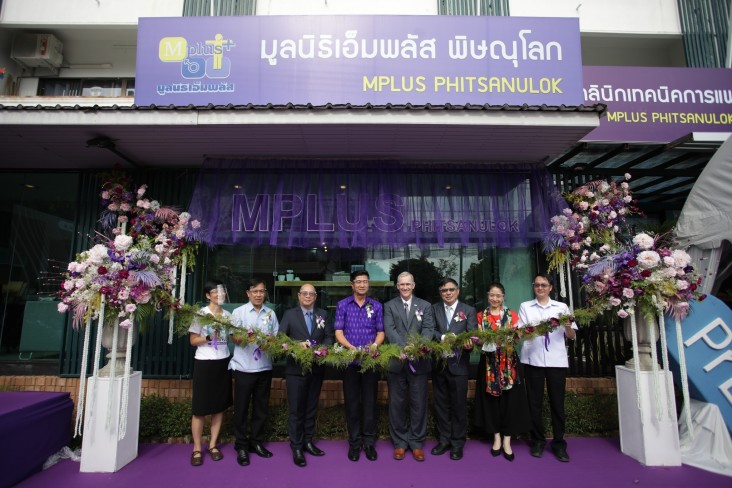Press Release Shim
Speeches Shim

For Immediate Release
Thanks to strong provincial collaboration, the United States Agency for International Development (USAID) expands a successful model of delivering HIV services to Phitsanulok through the Meeting Targets and Maintaining Epidemic Control (EpiC) project.
Phitsanulok, Thailand – USAID, together with the Mplus Foundation, Buddhachinaraj Hospital, the Phitsanulok Provincial Health Office, the Office of Disease Prevention and Control Region 2, and the National Health Security Office District 2, celebrated the grand opening of the new Mplus Phitsanulok community health center.
On the same day, these new partners in health also witnessed the signing of a memorandum of understanding (MOU) between Buddhachinaraj Hospital and the Mplus Foundation to support a cohesive and coordinated community-led HIV/AIDS response in Phitsanulok Province.
The Mplus Phitsanulok community health center offers friendly, high-quality HIV services, including HIV prevention, pre-exposure prophylaxis (PrEP) services, HIV testing, and linkage to treatment to hospitals both in province and nearby. Located less than a kilometer away from Buddhachinaraj Hospital, the clinic receives both technical and financial resources from the U.S. President’s Emergency Plan for AIDS Relief (PEFPAR) through USAID.
Among the dignitaries applauding this effort were Ronnachai Jitwiset, Governor of Phitsanulok Province; Dr. Sarayuth Uttamangkapong, Director of the Office of Disease Prevention and Control Region 2 and representative from the Department of Disease Control; Dr. Rattaphon Triamvichanon, Assistant Secretary-General, National Security Health Office (NHSO); Steven G. Olive, Ph.D., Mission Director of USAID’s Regional Development Mission for Asia; and Dr. Nittaya Phanuphak, Executive Director, Institute of HIV Research and Innovation.
Dr. Sarayuth Uttamangkapong, Director of the Office of Disease Prevention and Control Region 2, representative from the Department of Disease Control, the Thai Ministry of Public Health, said, “It was a great honor to see such strong commitment from many sectors in Phitsanulok to work towards achieving … the Thailand national strategy to end the AIDS epidemic by 2030.”
Dr. Steven G. Olive, Ph.D., Mission Director of USAID/RDMA, said “Since 2015, PEPFAR, through USAID, has provided over $37 million to eradicate HIV/AIDS in Thailand. In close partnership with the Royal Thai Government and local community-based organizations, USAID has contributed to key achievements over the last five years, including reaching more than 170,000 at-risk people, testing more than 100,000 at drop-in-centers, and supporting 10,000 on antiretroviral treatment. One of the keys to success of this model is a commitment to close collaboration between stakeholders and community-based organizations through sharing technical and financial resources to implement this model, which is now happening in Phitsanulok.”
Dr. Nittaya Phanuphak Pungpapong, Executive Director of Institute of HIV Research and Innovation (IHRI) said, “Community involvement is the key to ending the AIDS epidemic in Thailand and should be integrated into the national HIV response.”
The Mplus Foundation evolved from the Chiang Mai Provincial Public Health Office project “Health Consciousness for the New MSM Generation,” whose goal was to help men who have sex with men access essential health services. In 2011, Mplus was officially registered with the Thai government as a charitable foundation. With support from PEPFAR and USAID, Mplus has continuously expanded its activities and HIV services, from a solely reach-focused organization to providing the full cascade of HIV services (prevention, care, and treatment) through the key population-led HIV services model in Chiang Mai and Chiang Rai. The new center in Phitsanulok will help expand health services to key populations in lower Northern Thailand.

Comment
Make a general inquiry or suggest an improvement.